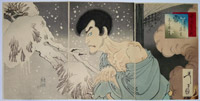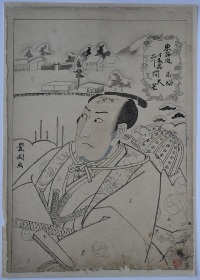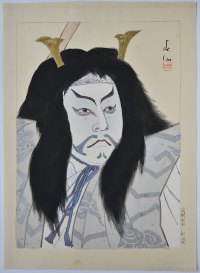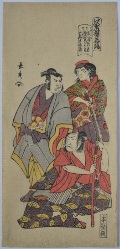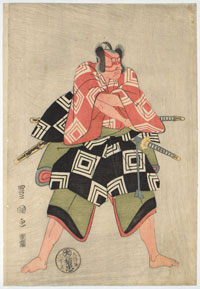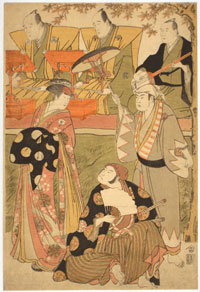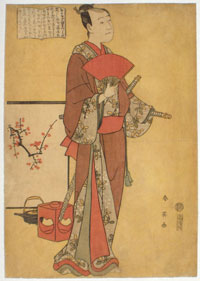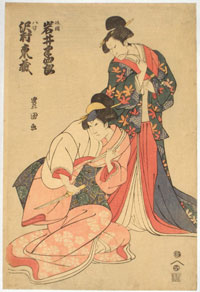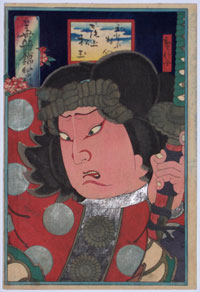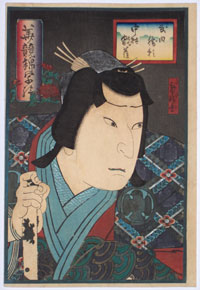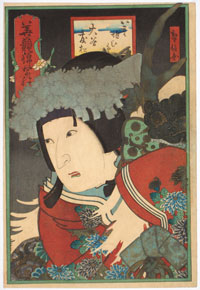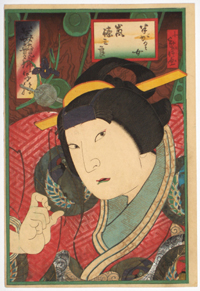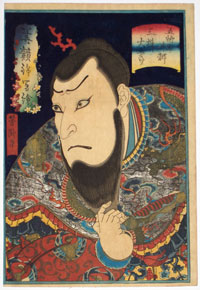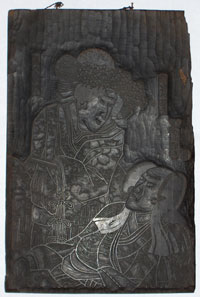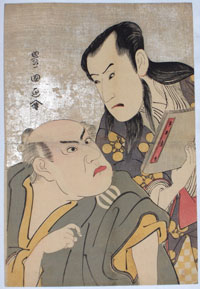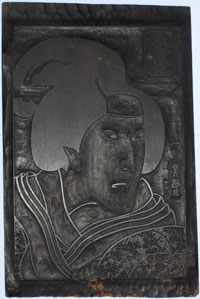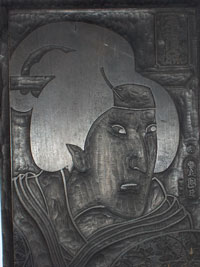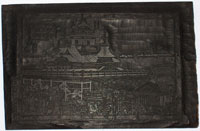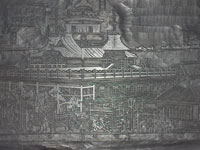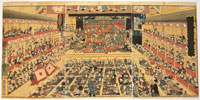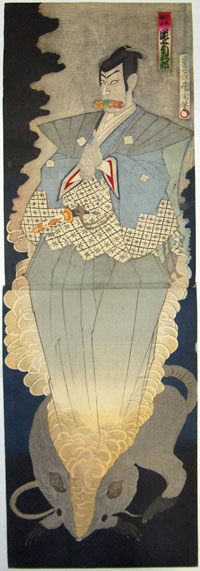/category/actors/page/4/
Attributed to SEIKOKU (Active c. 1794-1818)
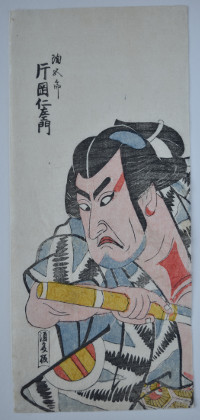
Click here to view image full size.
A kapazuri-e (stencil print) hosoban showing the actor Kataoka Nizaemon VII (1755-1837) as Togoro. A striking design and probably unique. There are similar prints signed by Chorakusai (Seikoku) and the publisher Suharaya Tosuke was active c. 1812-1829 and is known to have published prints by Seikoku. Published c. 1817.
Fine impression, colour and condition.
Status: Sold
Utagawa TOYOKUNI I (1769-1825)
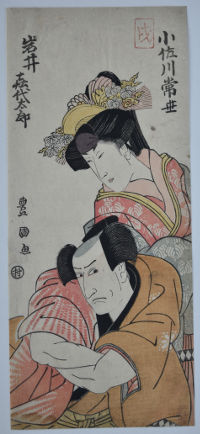
Click here to view image full size.
A hosoban showing the actor Iwai Kiyotaro II as Arakawa Taro and standing above him in an onnagata role Osagawa Tsuneyo II as the lady Koromode Gozen in the play Toki ni oshu Tsubo no ishibuni performed at the Ichimura-za Thatre in the 11th month 1802. At the top right is a seal which reads Inu, “Dog” (for Dog year 1802). Published by Murataya Jirobei.
Very good impression, colour and condition. Signed Toyokuni ga. e actor Kataoka Nizaemon VII (1755-1837) as Togoro. A striking design and probably unique. There are similar prints signed by Chorakusai (Seikoku) and the publisher Suharaya Tosuke was active c. 1812-1829 and is known to have published prints by Seikoku. Published c. 1817.
Status: Sold
Utagawa TOYOKUNI I (1768-1825)
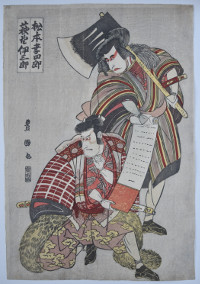
Click here to view image full size.
An actor print showing Ogino Isaburo II as the bandit Kaido Saburo standing with axe, and Matsumoto Koshiro V as Taira no Masakado in the play Otoko narikeri onna Masakado, “What Men ? A Female Masakado” performed at the Ichimura-za Theatre, 11/1801. Published by Izumiya Ichibei.
Very good impression, colour and condition. Signed Toyokuni ga.
Status: Sold
Utagawa KUNISADA (1786-1865)
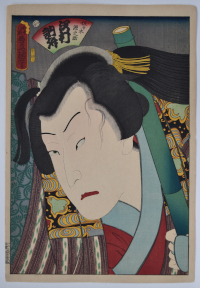
Click here to view image full size.
The actor Sawamura Tossho II as Sasaki Gennosuke from the play Hana ayame katami ezoshi. From the last great actor set which was planned as a monument to his career and used only the most expensive materials. An untitled set (but known as Konjaku kabuki meiyo, “Actors Portraits Past and Present.”) Seventy-two prints were completed from an intended one hundred and fifty, with twelve of them being by Yoshitora. Published by Ebisuya Shoshichi (Kinshodo) between 1860 and 1869 (this being 1863).
Very fine impression on thick hosho. Very fine colour with burnishing and blind-printing. Fine condition. Signed Nanajuhassai Toyokuni hitsu, “By the ninety year old Toyokuni.”
Status: Sold
Utagawa KUNISADA (1786-1865)
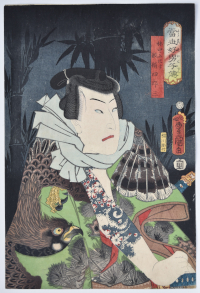
Click here to view image full size.
A bust portrait of the actor Bando Hikosaburo V as Samezaya Shiroza compared to Lin Chong (from the famed Chinese novel Shui Hu Zhuan, “Outlaws of the Marsh”) retold by Takizawa Bakin (1767-1848) in his novel “The Water Margin: New Illustrated Edition” published in 1805. There are three groups of three prints with background motifs of Pine, Bamboo (as here) and Plum, being the symbols of longevity. He is shown with a heavily tattooed arm of plum blossom and his coat is decorated with a design of a large eagle enveloping his shoulders. Published by Hayashiya Shogoro, 1859.
Very fine impression. Fine colour and condition. Signed Ni Konomi Toyokuni ga.
Status: Sold
Toyohara KUNICHIKA (1835-1900)
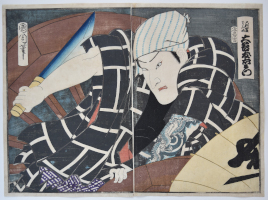
Click here to view image full size.
A diptych showing the actor Otani Tomoemon V as the firefighter Kurikara Denji in the play Fuji to mimasu suehiro soga performed at the Morita-za Theatre, 2/1866. Interestingly, the Museum of Fine Arts, Boston has the original playbill, acc. no. 11.28195. Firemen were usually heavily tattooed demonstrating their masculinity. Published by Otaya Takichi, 3/1866.
Very good impression and colour. The pigments have oxidised somewhat giving a nice patina. Very good condition. Signed Kunichika fude.
Status: Sold
Toyohara KUNICHIKA (1835-1900)
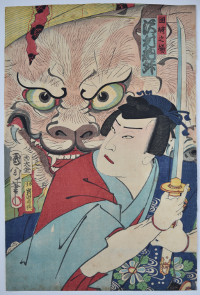
Click here to view image full size.
The actor Sawamura Tossho II in the Okazaki no ba, “Okazaki Scene” from Okazaki no neko, “The Cat of Okazaki.” This episode from the famous play takes place in an old temple at Okazaki on the Tokaido. An old cat witch haunts the temple attacking young women. Published by Daikokuya Kinzaburo, c. mid 1860s. Rare.
Very good impression, colour and condition. Signed Kunichika hitsu.
Status: Sold
Utagawa KUNISADA II (1823-1880)
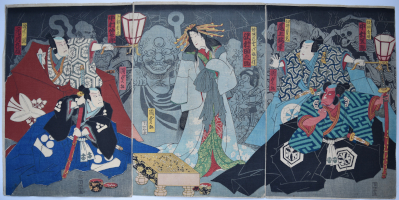
Click here to view image full size.
A triptych showing the actors Nakamura Shikan IV as Sakata Kintoki and Onoe Baiko V as Usui Sadamitsu – both henchmen of Watanabe no Tsuna (Raiko) – on the right; Sawamura Tanosuke III as the courtesan Usugumo (actually the spirit of a spider), centre, and Nakamura Chutaro as Urabe Hidetake – another henchman of Raiko – and Ichikawa Kuzo III as Watanabe no Tsuna on the left. Goblins and skeletons abound in the background. From the play Kubei yoi no itosuji performed at the Morita-za Theatre, 1864. Published by Iseya Kanekichi.
Very good impression, colour and condition. Signed Kunisada ga.
Status: Sold
Katsukawa SHUNSHO (1726-1792)
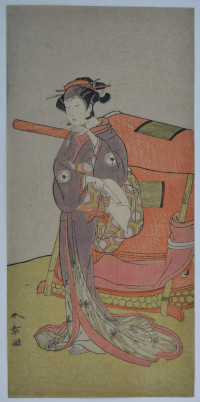
Click here to view image full size.
An hosoban showing the actor Iwai Hanshiro IV in an unidentified female role holding a letter beside a palanquin. What appears to be another version by Shunsho is in the Met, acc. number JP2783. Published c 1773.
Fine impression. Extremely good colour. Very good condition. Signed Shunsho ga.
Status: Sold
Utagawa KUNISADA (1786-1865)
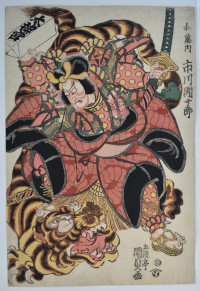
Click here to view image full size.
The actor Ichikawa Danjuro VII as the half-Chinese, half-Japanese hero Watonai in a production of the play Kokusen’ya kassen staged at the Nakamura-za Theatre, 8/1816. Shows a popular scene from the play where Watonai overcomes a man-eating tiger in China by using a charm from the Ise Shrine. He holds a post with the characters reading Daijinga, “Grand Shrine” used in the inner and outer shrines at Ise. Published by Nishimuraya Yohachi 1816. Extremely early and rare.
Fine impression and colour. Trimmed at left, otherwise very good condition. Signed Gototei Kunisada ga.
Status: Sold
Shunkosai HOKUSHU (Fl. c 1808-1832)
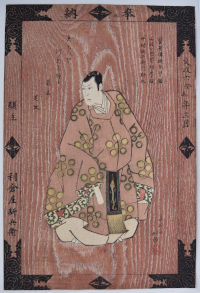
Click here to view image full size.
The actor Nakamura Utaemon III as Kan Shojo in the play Sugawara denju tenarai kagami, “Mirror of Learning and Transmitting Sugawara’s Secrets of Calligraphy.” In fact based on stories relating to Sugawara Michizane (845 – 903, scholar, poet and politician). Government regulations prohibited the use of the names of real people in Kabuki. He is shown on a wood votive tablet. The play was performed at the Kado no Shibai Theatre, Osaka, 3/1823. In fact, Utaemon is supposed to have sensationally played 7 roles in this play. Poem above by Shikan (Utaemon’s poetry name). Published by Toshikuraya Shinbei (inscribed bottom left).
Fine impression. This is a wonderful example of kimetsubushi printing whereby the grain of the wood is exposed with stiff brushes or pads to enable the grain to be printed. Very good colour and condition. Signed Shunkosai Hokushu ga.
Status: Sold
KATSUKAWA SCHOOL
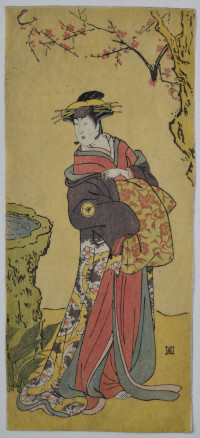
Click here to view image full size.
The actor Iwai Hanshiro IV probably in a new year Soga play. Unidentified publisher, published c late 1780s.
Fine impression. Exceptional colour. Fine condition.
Status: Sold
Torii KIYOMASU II (Fl. c 1720s -1760)
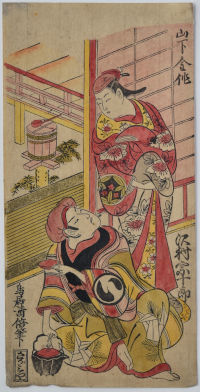
Click here to view image full size.
An exceptional Primitive showing the onnagata actor Yamashita Kinsaku I looking down at the actor Sawamura Sojuro I who is holding a kettle and teacup. Published by Sagami-ya Yohei c late 1720s.
Very good impression. Urushi beni-e with hand-applied colour: Tan, yellow, light and dark beni and green. Lacquered sumi over an embossed pattern and gold powder. Minor soil and small nick out of bottom edge, otherwise very good condition. Signed Torii Kiyomasu hitsu.
Status: Sold
Torii KIYOTOMI (FL. c 1720 -1740)
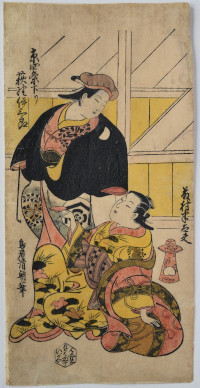
Click here to view image full size.
The actor Ogino Isaburo I looking down on the onnagata actor Fujimura Handayu II. An inscription above Ogino Isaburo states: Kyo Shijo kudari, “Coming from Shijo (Fourth Street) from the Capital.” Indicating the actor was on tour in Edo. Kyoto was considered the capital at that time and the Kabuki theatre was located on Fourth Street in Kyoto. Published by Igaya Kan’emon (Bunkido) c mid 1720s.
Very good impression. Urushi beni-e with hand-applied colour: Tan, yellow, light and dark beni and blue. Lacquered sumi over an embossed pattern and gold powder. Some soil and expertly repaired wormage, otherwise very good condition. Signed Torii Kiyotomi hitsu.
Status: Sold
Torii KIYOMASU II (Fl. c 1720s -1760)
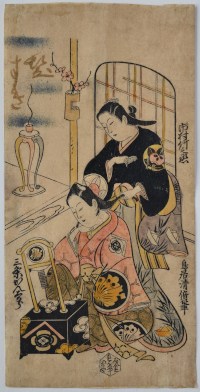
Click here to view image full size.
The onnagata actor Ichimura Takenojo IV standing and combing the hair of a fashionable young man played by Sanjo Kantaro II. Above, left, is the title printed in gold: Kamisuke, “Hair-combing.” These romantic scenes show the tenderness and love between a man and a woman. There is another version of this scene with the same actors by Okumura Toshinobu. Published by Igaya Kan’emon (Bunkido) c early 1730s.
Very good impression. Urushi beni-e with hand-applied colour: Lilac, beni and yellow. Lacquered sumi over an embossed pattern and gold powder with sprayed blue bands around title. Light soil and small expertly repaired wormhole, otherwise very good condition. Signed Torii Kiyomasu hitsu.
Status: Sold
Tamura SADANOBU (Fl. c 1720s-1730s)
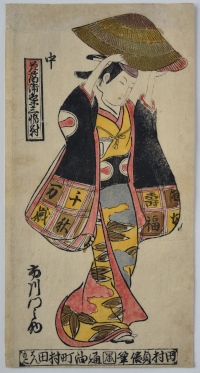
Click here to view image full size.
The An artist who seems to have specialised in triptychs. Shows the actor Ichikawa Monnosuke I shielding his head with a large sedge hat (kasa). The middle sheet (naka) of a triptych with title: Hana shobu irotagai sannpukutsui, “A Triptych of Irises in Alternating Colours.”(Possibly following the colours irises come in: Blue, purple, white.) On the sleeves are the auspicious characters denoting long life. Published by Murataya Jirobe (Eiyudo), c mid 1720s.
Very good impression. Urushi beni-e with hand-applied colour: tan, blue and beni. Lacquered sumi over an embossed pattern and gold powder. Slight loss of the sumi, otherwise very good condition. Signed Tamura Sadanobu hitsu.
Status: Sold
Torii KIYOMASU II (Fl. c 1720s -1760)
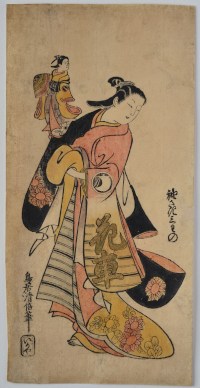
Click here to view image full size.
Shows the actor Sodesaki Miwano I as a proprietress of a house of assignation (kasha). He holds a puppet of the actor Ichikawa Monnosuke I dressed as a fashionable young man visiting the pleasure quarter holding a sedge hat to hide his face. Published by Igaya Kan’emon (Bunkido) c late 1720s.
Very good impression. Urushi beni-e with hand-applied colour: beni, yellow, lilac and pale green. Lacquered sumi over an embossed pattern and gold powder. Light soil and expertly repaired wormage, otherwise very good condition. Signed Torii Kiyomasu hitsu.
Status: Sold
Torii KIYOMASU II (Fl. c 1720s -1760)
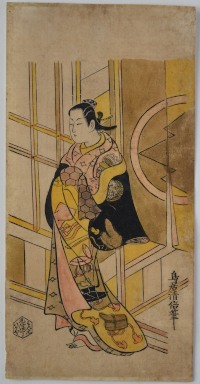
Click here to view image full size.
Shows a high-class courtesan emerging from a tea-house with slashed curtains. Possibly one sheet of a triptych. Published by Igaya Kan’emon (Bunkido) c mid 1720s.
Very good impression. Urushi beni-e with hand-applied colour: tan, light beni, light green and yellow. Lacquered sumi and gold powder (mostly lost). Light soil and expertly repaired wormage, otherwise good condition. Signed Torii Kiyomasu hitsu.
Status: Sold
Okumura TOSHINOBU (Fl. c 1717-1750)
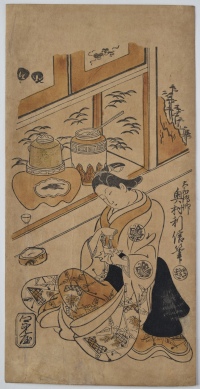
Click here to view image full size.
Shows a beauty whisking tea in front of an alcove. Published by Emiya Kichiemon c late 1720s.
Very good impression. Urushi with hand-applied tan colour. Lacquered sumi over an embossed pattern. Browned and some thinned areas, otherwise good condition. Signed Yamato gashi Okumura Toshinobu hitsu.
Status: Sold
Tsukioka YOSHITOSHI (1839-1892)
Click here to view image full size.
Snow from the set Setsugekka no uchi, “Snow, Moon and Flowers” published by Akiyama Buemon, 1890. Shows half-length portraits of famous actors, in this case Onoe Baiko V ( Onoe Kikugoro V, 1844-1903 ) as the priest Iwakura Sogen. Various versions of the story and play exist concerning Sogen’s infatuation with Irokotohime. First edition ( the second state titled “Iwakura Sogen in the Hermitage Scene from Hanafubuki” ). And with variegated cartouche.
Fine impression and colour. Very small corner repair, otherwise very good condition. Ample room for joining of sheets. Signed Yoshitoshi.
Status: Sold
Utagawa KUNISADA (1786-1865)
Click here to view image full size.
A preparatory drawing sold together with the published print showing the actor Sawamura Sojuro III as Oboshi Yuranosuke from the play Kanadehon Chushingura. [Yakusha mitate] Tokaido gojusan tsugi no uchi: Nihonbashi Shinagawa no aide, Takanawa, Yuranosuke, “Actors at the Fifty-Three Stations of the Tokaido: Takanawa between Nihonbashi and Shinagawa, Yuranosuke.” The drawing is from a group of 43 that were sold by a Milanese gallery in 1981. The set was published by Takadaya Takezo in 1852. Seal bottom right of the collector Kaoen. Three other drawings from this group are illustrated in Kunisada, Robert Schaap, Hotei Publishing, 2016, nos 103-105.
The drawing is laid down (as all were), sumi with light red and blue to the face. There are numerous annotations indicating the colours to be used. There are some differences between the drawing and the published print, mainly in the background landscape. The print is in good condition. The drawing is signed Toyokuni ga.
Status: Sold
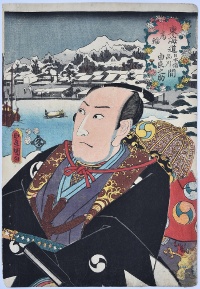
Click here to view image full size.
Utagawa TOYOKUNI I (1769-1825)
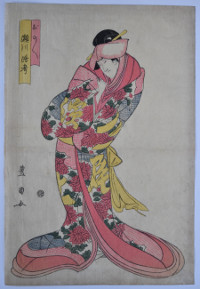
Click here to view image full size.
The actor Segawa Roko III as the Lady Onoe in the play Yanoji Musubi hana no gyoretsu, performed at the Nakamura-za Theatre, 4/1806.
Very good impression and colour. Minor creasing, otherwise very good condition. Signed Toyokuni ga.
Status: Sold
Tsukioka YOSHITOSHI (1839-1892)
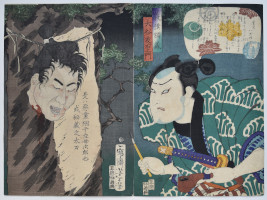
Click here to view image full size.
A diptych showing the actor Otani Tomoemon V as the loyal servant Gakuzo (aka Inukawa Sosuke Yoshito, one of the eight Dog half-brothers), brush in hand, having just hung the decapitated head of the evil Aboshi on a tree and written beside it: Kore ha akuto Aboshi Samojiro nari. Aruiwa hizo tachi, “This is the villain Aboshi Samojiro… He [stole] a treasured sword [Murasame – the treasured sword of the Ashikaga family].” Shows a scene from an episode in Part III, volume 5 of the Satomi Hakkenden no uchi, “Tales of the Eight Dogs of the Satomi Clan.” The macabre tale, written by Kyokutei Bakin (1767-1848) in 98 chapters and 106 booklets, revolves around the eight offspring of a supernatural marriage between a princess and her father’s dog and their commitment to restore the fortunes of the samurai house of Satomi. Published by Tamaya Sosuke 1868. Very rare: Keyes in his dissertation on Yoshitoshi lists just the right sheet from an oban series, presumably the print in the Philadelphia Museum of Art, ART568220, and another impression of just the right sheet is owned by Tateyama City in Chiba Prefecture.
Very good impression, colour and condition. Signed Kaisai Yoshitoshi hitsu. (Keyes attributes this print to Yoshitoshi as he hadn’t seen the left sheet.)
Status: Sold
Natori SHUNSEN (1886-1960)
Click here to view image full size.
An original watercolour on cartridge paper of the actor Onoe Kikugoro VI as Tomomori. Shunsen is famous for his print series of actors published by Watanabe from 1916 until 1954. 39.2 x 28.5 cms; 15.5 x 11.25 inches. Signed and sealed Shunsen. Minor foxing, otherwise good condition.
Status: Sold
Yurakusai NAGAHIDE (fl. c. 1804-1848)
Click here to view image full size.
A hosoban kappazuri print (stencil print) showing the actors Ichikawa Danzo IV, Yoshizawa Iroha I, and Arashi Kichisaburo II as Shurinosuke, his wife, and Toshihiro. Exceptionally rare: Seemingly the only other impression known is illustrated in 200 Years of Kamigata Ukiyo-e, 1975, no. 39. Published 1803. Publisher unread.
Very good impression. Fine colour. Very good condition. Signed Nagahide.
Status: Sold
Kikugawa EIZAN (1787-1867)
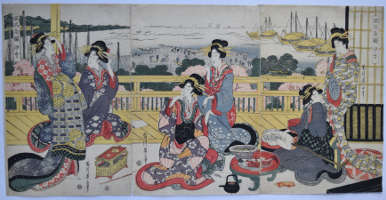
Click here to view image full size.
A triptych showing courtesans enjoying themselves on a balcony overlooking Tokyo bay. Furyu minami eki shiohi, “Fashionable South Station at Ebb Tide.” In fact, clam digging at low tide which can be seen in the background. This is a play on words as clams had erotic connotations. Shiohigari, “clam gathering” season is March to June with the peak coinciding with Golden Week at the end of April beginning of May. Published by Maruya Jinpachi, c. late 1810s.
Very fine impression and colour. Impeccable condition. Signed Kikugawa Eizan hitsu.
Status: Sold
Utagawa TOYOKUNI I (1769-1825)
Click here to view image full size.
A very fine portrait of the actor Ichikawa Danjuro VI in kumadori make-up and assuming an aragoto stance. The quality, date, style and publisher are the same as for his finest set of Portraits of Actors on Stage published 1794 – 6 although this design appears not to be from the set and I cannot locate another impression. There is a bust of Danjuro, probably in the same role, by Toyokuni in the same year – 1796 in the Achenbach, San Francisco. Published by Senichi.
Extremely fine impression and colour. Grey ground. A seal at bottom which appears on many Toyokuni I and Toyoshige prints and is probably a book and/or print seller ( it gives an address ). Very small binding holes at left edge. Full size. Fine condition. Signed Toyokuni ga.
Status: Sold
Torii KIYONAGA (1752–1815)
Click here to view image full size.
A fine actor design from a series of at least 31 such degatari prints ( showing singing or chanting at a theatre ). A scene from Shosa Hatsuhige yakko tanzen, played at the Ichimura-za theatre, November 1783. Shows Nakamura Nakazo as Tanzen seated with fan looking at Onoe Matsusuke as a young lady ( in reality a white fox ). To the right Ichimura Uzaemon as a yakko. The chanters Tomimoto Buzen-dayu and Tomimoto Itsuki-dayu at the back accompanied by Namizaki Tokuji. Published by Nishimura 1783. See Hirano, Kiyonaga, Museum of Fine Arts, Boston, no. 544, pl. LXXX.
Very good impression and colour. Slight soil, otherwise very good condition. Full size. Signed Kiyonaga ga.
Status: Sold
Katsukawa SHUN’EI (1762-1819)
Click here to view image full size.
An extremely rare yellow-ground aiban showing the actor Sawamura Sojuro III in the role of Nagoya Sanza in the play Keisei sanbon karakasa performed at the Miyako-za, 7/1794. In fact Shun’ei designed another print of the same actor and role, see the Walter Amstutz collection, Sothebys, 1991, lot 98. Shun’ei – the originator of the ‘Big Head’ – was something of an eccentric and a great lover of the theatre and sumo.
Fine impression with unfaded colour. Slight soil with small backed areas and slight horizontal creases, but generally very good. Signed Shun’ei ga.
Status: Sold
Utagawa TOYOKUNI I (1769-1825)
Click here to view image full size.
Shows Iwai Hanshiro IV as the wet nurse Masaoka and Sawamura Tozo as the evil serving lady Yashio in the play Omiura date nebiki performed at the Nakamura-za, 2/1799. Published by Eijudo. Light grey ground.
Fine impression, and condition. Perfect colour and completely untrimmed. Signed Toyokuni ga.
Status: Sold
Kinoshita HIRONOBU I (Active c1851-1870)
Click here to view image full size.
A large head oban print of the actor Onoe Shogyoku in an unknown role from a rare set: Zen (?) kurabe nishiki utsushie, “A Comparison of Virtuous Pictures.” Published c1859. This is the first deluxe edition with extensive burnishing, gold and silver. The set was reissued without these embellishments.
Very fine impression and colour. Some soil, offsetting and slight trimming. Signed Hironobu ga.
Status: Sold
Ichiyosai YOSHITAKI (1841-1899. Active c1854-1885)
Click here to view image full size.
A large head oban print of the actor Nakamura Kanjaku II as Takeda Katsuyori (?) from a rare set: Zen (?) kurabe nishiki utsushie, ‘A Comparison of Virtuous Pictures.’ Published c1859. This is the first deluxe edition with extensive burnishing, gold and silver. The set was reissued without these embellishments.
Very fine impression and colour. Some soil, offsetting and slight trimming. Signed Yoshitaki hitsu.
Status: Sold
Kinoshita HIRONOBU I (Active c1851-1870)
Click here to view image full size.
A large head oban print of the actor Otani Tomomatsu I as Yaegaki hime from a rare set: Zen (?) kurabe nishiki utsushie, ‘A Comparison of Virtuous Pictures.’ Published c1859. This is the first deluxe edition with extensive burnishing, gold and silver. The set was reissued without these embellishments.
Very fine impression and colour. Some soil, offsetting and slight trimming. Signed Hironobu ga.
Status: Sold
Kinoshita HIRONOBU I (Active c1851-1870)
Click here to view image full size.
A large head oban print of the actor Arashi Tokusaburo II ( or III [?] ) as Hangari on’na from a rare set: Zen (?) kurabe nishiki utsushie, “A Comparison of Virtuous Pictures.” Published c1859. This is the first deluxe edition with extensive burnishing, gold and silver. The set was reissued without these embellishments.
Very fine impression and colour. Some soil, offsetting and slight trimming. Signed Hironobu ga.
Status: Sold
Ichiyosai YOSHITAKI (1841-1899. Active c1854-1885)
Click here to view image full size.
A large head oban print of the actor Sancho Daisho (?) as the pirate Watonai ( Kokusenya, Coxinga ) from a rare set: Zen (?) kurabe nishiki utsushie, ‘A Comparison of Virtuous Pictures.’ Published c1859. This is the first deluxe edition with extensive burnishing, gold and silver. The set was reissued without these embellishments.
Very fine impression and colour. Some soil, offsetting and slight trimming. Signed Yoshitaki hitsu.
Status: Sold
Kochoro KUNISADA (1786-1865)
Click here to view image full size.
An original wood block showing actors as Kuzunoha and Abe no Yasuna. Kuzunoha was the fox wife of Yasuna and is usually depicted nursing her child or appearing as a white fox giving Yasuna the key to her disappearance in a dream. Au verso is an uninteresting design by Yoshifuji entitled Toita zukushi, a “Collection of Sliding Doors.” Rare: Blocks of seasoned wood had become expensive in the 19th century and old blocks were often planed down to be reused by later artists/publishers. Important blocks seldom come onto the market, and the few that do are invariably for later copies. Most were reused and/or burnt and destroyed. Signed Toyokuni ga. Publisher’s seal not read. Censors’ seals for 1849 – 53. Sold as is with some slight edge wormage, but otherwise surprisingly good condition.
Status: Sold
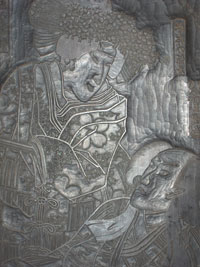
Click here to view image full size.
Utagawa TOYOKUNI (1769-1825)
Click here to view image full size.
A silver mica-ground double bust portrait of Hikosaburo Bando III as Kan Shojo ( Sugawara Michizane ) disgraced and sent to Tsukushi, and Kataoka Nizaemon VII as Hakudayu from the play Sugawara denju tenarai kagami, “Sugawara’s Secrets of Calligraphy.” The play was written for the puppet theatre in 1746 and quickly adapted for Kabuki. Published by Yamaden, Kansei 8 ( 1796 ). Extremely rare. Unidentified collector’s seal au verso.
Fine impression. Perfect colour. Some slight loss of mica ( as per usual ) and a slight centre fold. Signed Toyokuni ga.
Status: Sold
Kochoro KUNISADA (1786-1865)
Click here to view image full size.
An extremely important original wood block. Shows the onnagata actor Onoe Kikugoro IV as the chinohito, ‘wet-nurse,’ Masaoka, in the play ‘Konoshita Masagono Date-zome,’ performed at the Ichimura Theatre, 9/1855. Designed for the late, fine set of deluxe bust portaits published by Ebisuya Shoshichi ( except two ) between 1860 and 1869. There are also eleven designd by Yoshitora. The culmination of Kunisada’s carrer. On the reverse of the block is a design by Utagawa Kunitoshi ( 1847 – 99 ) with title Tokyo meisho Kaiunbashi dai-ichi kokuritsu ginko, ‘First National Bank at Kaiun Bridge, Famous Views of Tokyo.’ Published Meiji 10 ( 1877 ) by Naraha Shutei. Signed Kunitoshi hitsu. Blocks of seasoned wood had become expensive in the 19th century and old blocks were often planed down to be reused by later artists/publishers. Important blocks seldom come onto the market, and the few that do are invariably for later copies. Most were reused and/or burnt and destroyed. Signature Toyokuni ga with publisher’s seal Kinshodo and Sho; carver’s seal choko Ryuzo and Aratame censor’s seal 3/1860. Sold as is with some slight edge wormage, but otherwise surprisingly good condition.
Status: Sold
Kochoro KUNISADA (1786-1865)
Click here to view image full size.
A fine view of the inside of a theatre with a performance taking place. The faces of the audience in the stalls are carefully drawn and it’s obvious that many were meant to be recognised. Published by Noshuya Yasubei, 1858. Rare.
Fine impression and colour. Offsetting on last sheet and trimmed slightly on left. Other minor marks and rubbing. Signed Ichiyosai Hinajishi Toyokuni ga.
Status: Sold
Toyohara KUNICHIKA (1835-1900)
Click here to view image full size.
A vertical diptych showing Onoe Kikugoro V as Nikki Danjo transforming himself by majic into a rat. In his mouth the stolen will with which he was trying to strip Tsuru-chiyo of his inheritance. Title of play: Meibuku Sendai hagi, “The Disputed Succession.” Published by Fukuda Kumajiro, 1887. Rare.
Fine impression. Very good colour. Some burnishing. Slight offsetting and oxidation. Retains original album backing. Signed Toyohara Kunichika hitsu.
Status: Sold
